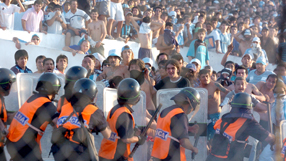Argentina to trial I.D cards to eradicate hooligans
BUENOS AIRES - Argentina is to introduce a high-tech identity card scheme in place of old-fashioned paper tickets and turnstiles in an ambitious attempt to fight the country's notorious soccer hooligans.

The scheme, authorised by the Argentine Football Association (AFA), will use biometric scanners and electronic cards containing their name, address, photo and fingerprints.
"Anyone who wants to go to a football stadium must be registered on a database and possess a magnetic card which includes their name, photo, document number and fingerprints," the AFA said in a statement.
The high technology equipment is likely to be an incongruous sight at Argentine stadiums, many of which are in a dilapidated state, and there is speculation as to whether the scheme can really tackle a problem which is deeply ingrained.
Around four million people are expected to apply for one of the cards which have been developed in conjunction with the National Technology University (UTN) under a programme baptised the Unique Database for the Identification of Supporters (PUIA).
The AFA said that the clubs will be responsible for processing applications.
When the supporters want to go to a game, they will have to top up their card at an accredited bank -- rather like a transport card. Tickets will no longer be sold at stadiums.
On arriving at the stadium, the card will be checked by security officers and fans' fingerprints scanned to make sure each one is the owner of the card he or she is carrying.
Get FourFourTwo Newsletter
The best features, fun and footballing quizzes, straight to your inbox every week.
By swiping the card, officials will know whether the fan has paid to get into the game.
A trial will be held at first division club Lanus, starting in May, and if there are no hitches, it will be introduced at all first division clubs early next year.
BUREAUCRATIC NIGHTMARE
The idea of having to obtain yet another document in a country noted for its suffocating bureaucracy is likely to have many people pulling their hair out in exasperation.
Argentines are already obliged to carry an identity card without which it is almost impossible to open a bank account, rent a flat, obtain health insurance or use a credit card.
But AFA spokesman Ernesto Cherquis said something had to be done about the violence at stadiums.
"We have to at least try," he said in a radio interview. "It will favour 99.9 percent of the supporters."
Many Argentine stadiums look like European grounds from the 1970s with rowdy fans packed in behind high wire fences. A goal is often celebrated by a so-called avalanche in which fans charge down the terraces en masse.
Although this produces a passionate atmosphere unmatched anywhere in the world, the game is plagued by violence and, in the last few years, several matches have been suspended due to riots and there have been a number of deaths.
Most of the trouble is blamed on organised groups of supporters known as barras bravas, who often receive perks from their clubs such as free tickets to matches and even subsidised travel to away games. Sometimes, they take sides in internal disputes between club directors.
